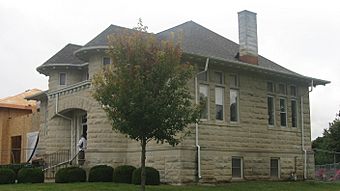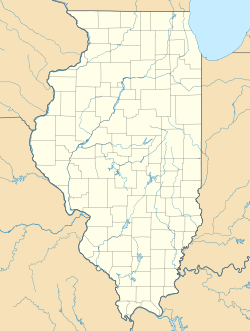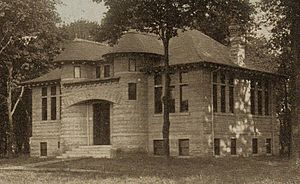El Paso Public Library (Illinois) facts for kids
Quick facts for kids |
|
|
El Paso Public Library
|
|

Front and eastern side
|
|
| Location | 149 W. First St., El Paso, Illinois |
|---|---|
| Area | less than one acre |
| Built | 1906-07 |
| Built by | Joseph A. Reichel |
| Architect | Paul O. Moratz |
| Architectural style | Romanesque |
| MPS | Illinois Carnegie Libraries MPS |
| NRHP reference No. | 94000972 |
| Added to NRHP | August 16, 1994 |
The El Paso Public Library is a special kind of library called a Carnegie library. You can find it at 149 West First Street in El Paso, Illinois, United States. This library building was built between 1906 and 1907. It was designed by an architect named Paul O. Moratz in a style called Richardsonian Romanesque. Because of its unique history and design, the library was added to the National Register of Historic Places in 1994.
Contents
History of the Library
The idea for a library in El Paso started way back in 1873. A group called the Ladies' Library Association created the first library. It was first kept in a room in the Eagle Block Building. Sadly, that building burned down in 1894, and the library was destroyed.
After the fire, the library found a temporary home. The Ladies' Library Association then decided it was time for a permanent building. They also thought the city should take over the library. In 1904, the city of El Paso officially took ownership. The next year, they approved a special tax to help fund the library.
In 1906, something big happened! The city received a $6,000 grant from the Carnegie Foundation. This money was specifically for building a new library. The building was finished in 1907 and opened on February 22. It started with 1,300 books from the old association and 500 new ones. Citizens also donated $1,000 to buy even more books.
Modern Expansion and Growth
In 2010, the library began to think about getting bigger. They wanted more space for books and for people to use. They also wanted to make the library easier for everyone to access. Fundraising for this expansion took place in 2012 and 2013. Construction began in 2013, and the expanded library opened in 2014.
The new space added many great features. There's a much larger children's area called the Edward and Marjory Heiken Children’s Room. There's also a multi-use room for children's programs and more public computers. The Lester Pfister History and Genealogy room displays local historical items. Plus, the Drake Family-Heartland Bank Community Room is used for library events and community meetings.
Becoming a Library District
In 2016, the Library Board made another important decision. They voted to change the library from a city library to an independent library district. This would allow it to serve not just El Paso, but also the surrounding towns. In 2017, both the El Paso City Council and the Library Board approved this change.
In July 2017, the El Paso District Library was officially created. It now serves all parts of Woodford County that are within the El Paso Gridley School District. This means more students and families can use the library's services.
Architecture of the Library
The El Paso Public Library was designed by Paul O. Moratz. He was an architect from Bloomington. He also designed many buildings in the White Place neighborhood there. Moratz designed the library in a style called Richardsonian Romanesque. He was inspired by the Morgan Park Library in Chicago.
The library is a two-story building. Its outside walls are made of light brown (buff) stone. It sits on a brick foundation. On each side of the front door, there are round turrets. These turrets are connected by a curved arch above the main entrance. The building has a hip roof with exposed wood beams (rafter tails) and decorative carvings (dentils) above the entrance.
When the library was expanded in 2013, the board wanted to protect the original building. The architects, Apace Design, made sure the new parts matched the old. They used similar light brown stone for the outside. This careful design helped keep the original Carnegie Library on the National Register of Historic Places. It shows how old and new designs can work together.
 | Laphonza Butler |
 | Daisy Bates |
 | Elizabeth Piper Ensley |




